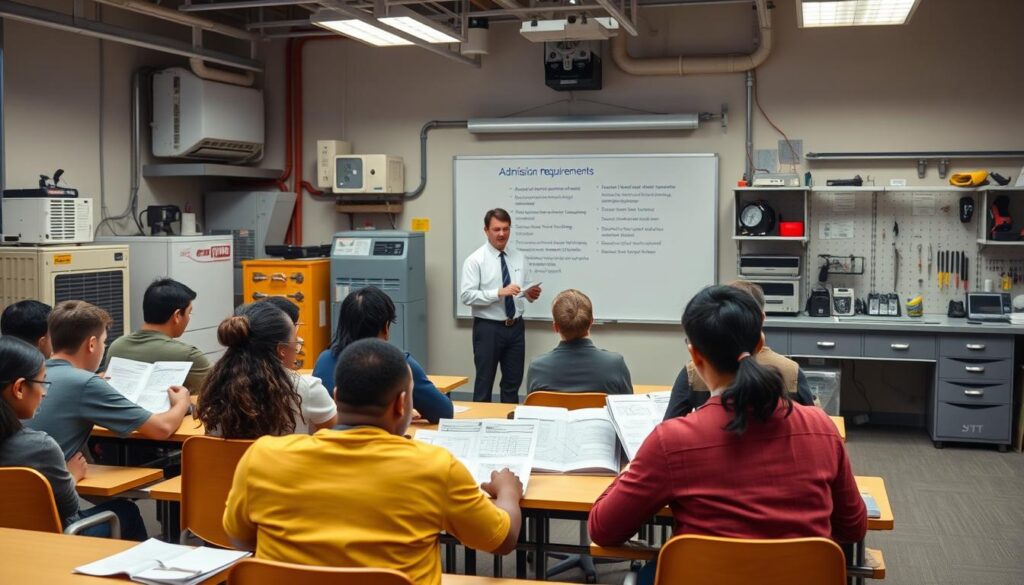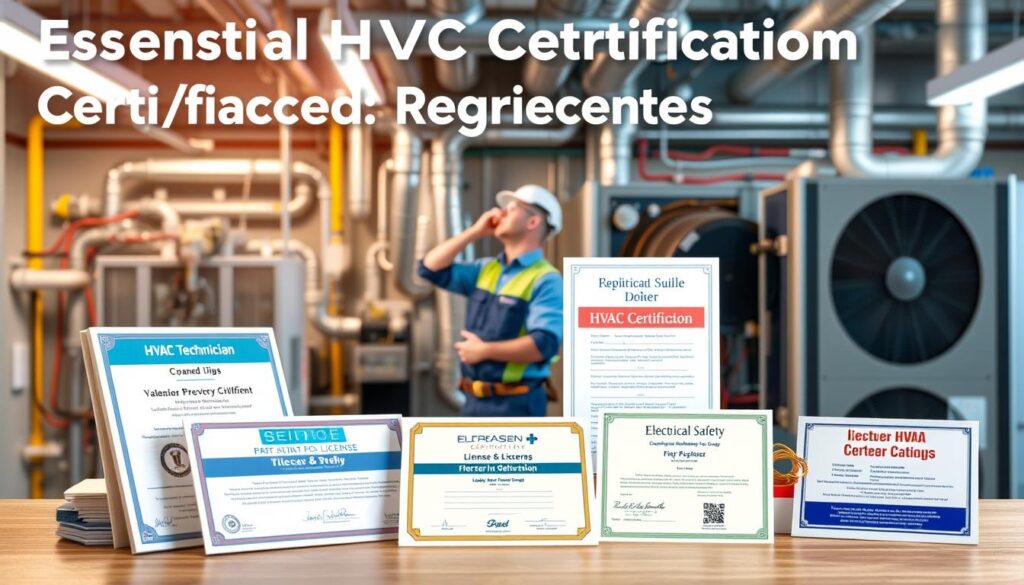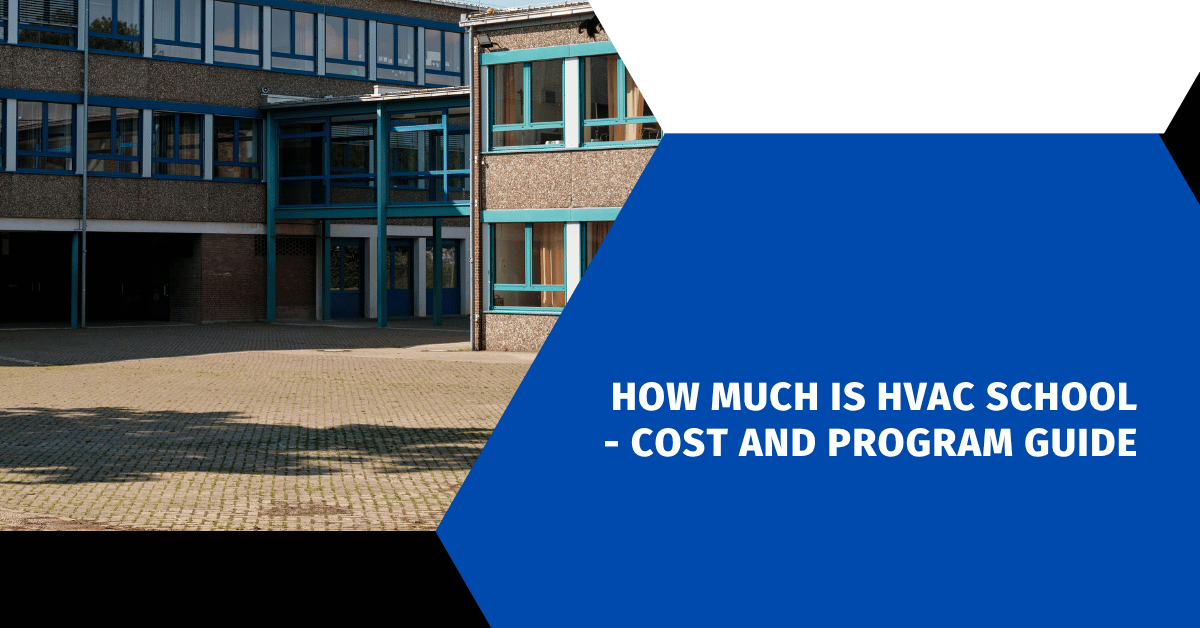Affiliate Disclosure
HVAC Guide Guys is a participant in the Amazon Services LLC Associates Program, an affiliate advertising program designed to provide a means for sites to earn advertising fees by advertising and linking to Amazon.
How Much Is HVAC School ? Are you ready to start a career that keeps places comfortable all year? Learning about HVAC school costs could be your first step. It’s a rewarding technical job that offers stability and growth.

HVAC training opens the door to a vital industry where skilled workers are always needed. Knowing the cost and program options helps you choose the right path for your future.
There are many ways to become an HVAC pro, from vocational schools to community colleges. Each path has its own benefits for a career in heating, ventilation, and air conditioning.
Key Takeaways
- HVAC training costs vary based on program type and institution
- Technical schools offer specialized certification programs
- Career opportunities in HVAC continue to expand
- Financial aid and scholarships can reduce educational expenses
- Hands-on training is critical for career success
Table of Contents
Understanding HVAC Training Programs and Career Paths
The HVAC industry is full of exciting opportunities for those who love technical work. Your journey starts with learning about the different training programs and the careers they open up.
Choosing the right HVAC certification program is key to a successful career. Each program offers unique skills and can help you move up in your career.
Types of HVAC Certification Programs
HVAC training comes in many forms to fit different learning styles and goals:
- Certificate Programs (6-12 months)
- Associate Degree Programs (2 years)
- Apprenticeship Programs
- Online and Hybrid Learning Options
Career Opportunities in HVAC
With your HVAC education, you can explore many career paths, such as:
- Residential HVAC Technician
- Commercial Systems Specialist
- Industrial Equipment Maintenance
- Energy Efficiency Consultant
- HVAC Sales and Design
Industry Growth and Demand
The HVAC industry is growing fast, with more jobs for skilled workers. Technological advancements and a focus on energy efficiency mean lots of chances for trained technicians.
The Bureau of Labor Statistics predicts a 5% increase in HVAC technician jobs by 2030. This shows a stable and promising career path.
Explore Our HVAC Shop
Looking for top-rated HVAC tools, parts, and accessories? Visit our shop and find the perfect solution for your needs.
Visit the ShopHow Much Is HVAC School: Complete Cost Breakdown
Knowing how much HVAC school costs is key for future technicians. The price of HVAC school varies, but you can find affordable options. This way, you can fit your education into your budget.
Understanding HVAC training costs is essential. We’ll look at the main expenses to help you plan for your education.
Tuition and Program Fees
HVAC programs have different prices based on the school and how long they last. Here’s a general cost guide:
| Program Type | Duration | Estimated Cost |
|---|---|---|
| Certificate Program | 6-12 months | $3,000 – $5,000 |
| Associate Degree | 2 years | $10,000 – $20,000 |
| Online HVAC Courses | Flexible | $2,500 – $4,500 |
Additional Expenses to Consider
- Textbooks and study materials: $300 – $600
- Tools and equipment: $500 – $1,500
- Safety gear and uniforms: $200 – $400
- Certification exam fees: $100 – $300
Financial Aid Options
Cost shouldn’t stop you from starting your HVAC career. There are many ways to get financial help:
- Federal Student Aid: Fill out the FAFSA for grants and loans
- Scholarships for technical education
- Employer tuition reimbursement
- State vocational training grants
By looking into these options, you can lower your HVAC school costs. This makes your training more affordable.
Program Duration and Study Options
Exploring HVAC vocational training means looking at different program formats. Your path into this field has many options. These options fit your learning style and career goals.
HVAC career preparation programs vary from short-term certificates to full degrees:
- Certificate Programs: 6-12 months of focused technical training
- Associate Degree: 2-year of in-depth technical education
- Bachelor’s Degree: 4-year for advanced technical and management skills
There are various study formats to fit your schedule and learning style:
- Full-time in-person programs
- Part-time evening classes
- Online hybrid learning models
- Weekend intensive training
When picking your HVAC vocational training, think about your work, money, and learning style. Many schools offer flexible schedules for working professionals.
Pro Tip: Choose a program with lots of hands-on training and real-world experience.
Today’s HVAC training focuses on both practical skills and theory. Look for programs with lab work, industry certifications, and real-world experiences. This will help you build a solid professional base.
Explore Our HVAC Shop
Looking for top-rated HVAC tools, parts, and accessories? Visit our shop and find the perfect solution for your needs.
Visit the ShopHVAC School Admission Requirements
Getting ready for HVAC training means planning and knowing what’s needed. You’ll need to show you’re ready for the technical training ahead. This involves meeting certain requirements.

The HVAC program admission process can seem tough. But, knowing what’s required can make your application smoother. This increases your chances of getting in.
Academic Prerequisites
HVAC schools have basic academic needs. They make sure students are ready for the technical training:
- High school diploma or equivalent (GED)
- Minimum grade 12 mathematics credit
- Recommended credits in:
- Physics
- Computer engineering
- Business communication
Technical Requirements
For HVAC apprenticeship fees and programs, you’ll need to meet technical criteria:
- Basic mechanical aptitude assessment
- Physical fitness evaluation
- Background check
- Proof of valid driver’s license
Language Proficiency Standards
If you’re an international student or need hvac licensing, language skills are key. Most programs require:
- TOEFL or IELTS test scores
- Minimum English comprehension level
- Ability to read and understand technical manuals
Make sure to check each school’s specific admission rules. This ensures you meet all the requirements for your HVAC education.
Explore Our HVAC Shop
Looking for top-rated HVAC tools, parts, and accessories? Visit our shop and find the perfect solution for your needs.
Visit the ShopCore Curriculum and Course Content
Starting your journey as an HVAC technician means diving into a detailed curriculum. It’s designed to turn you into a skilled pro. The core program focuses on key areas that set you up for success in your HVAC career.
Students get into specialized training that covers many important topics:
- Sheet metal fabrication techniques
- HVAC system design
- Computer-aided drafting applications
- Workplace safety protocols
- Gas code regulations
- Blueprint reading skills
The curriculum mixes theory with practical skills. You’ll learn about thermodynamics, electrical systems, and refrigeration. This is through interactive learning experiences.
| Course Category | Key Learning Objectives |
|---|---|
| Technical Systems | Understanding heating, cooling, and ventilation mechanisms |
| Energy Efficiency | Analyzing sustainable technology and green solutions |
| Digital Applications | Mastering computer-aided design and diagnostic tools |
Your program will include hands-on lab work, simulations, and real-world problems. These help develop the technical and diagnostic skills needed for HVAC professionals today.
Essential Certifications and Licensing Requirements
Understanding HVAC certification programs and licensing is key for a successful HVAC career. You need the right credentials and to keep up with industry standards.

Professional certification shows your skills and dedication to HVAC. It proves your worth, making you more employable and increasing your salary.
Industry-Specific Certifications
Here are some certifications that can help your HVAC career:
- EPA Section 608 Certification
- NATE (North American Technician Excellence) Certification
- R-410A Refrigerant Handling Certification
- Gas Technician Certifications
State Licensing Requirements
Licensing rules for HVAC vary by state. You usually need education, experience, and a passing exam. To become a licensed HVAC pro, you’ll:
- Finish an accredited HVAC training program
- Get practical work experience
- Pass a state-specific licensing exam
Continuing Education Requirements
Keeping up with HVAC industry changes is essential. Most states require continuing education units (CEUs) to keep your license and certification.
| Certification | Average CEU Hours | Renewal Cycle |
|---|---|---|
| EPA Section 608 | 4-8 hours | Every 2 years |
| NATE Certification | 16 hours | Every 2 years |
| State HVAC License | 8-24 hours | Varies by state |
Investing in your growth through HVAC certification programs and meeting licensing needs will set you up for success in this fast-paced field.
Explore Our HVAC Shop
Looking for top-rated HVAC tools, parts, and accessories? Visit our shop and find the perfect solution for your needs.
Visit the ShopHands-On Training and Practical Experience
HVAC vocational training is more than just sitting in a classroom. Your success in the field relies on real-world skills. These skills are gained through hands-on experience.
During your HVAC apprenticeship, you’ll face many learning experiences. These prepare you for the challenges you’ll meet in the real world. You’ll get to do things like:
- Lab simulations of complex heating and cooling systems
- Installation and repair workshops
- Equipment maintenance and diagnostic exercises
- Live project implementations
One great thing about HVAC apprenticeship fees is they often include a lot of practical training. For example, you might work on a big project like replacing a gas-fired furnace. This project includes:
- Detailed system planning
- Component fabrication
- Complete installation
- Electrical wiring
These experiences give you a deep understanding of HVAC work. By working with equipment and solving real problems, you’ll gain confidence and skill. This will help you succeed in your future career.
“Practical experience is the cornerstone of professional success in HVAC technology.” – HVAC Industry Expert
Technology and Equipment Requirements
Getting ready for an HVAC career is more than just learning technical skills. You need the right tools and digital resources to do well. Knowing what you need can help you keep your hvac training cost down.
Today’s HVAC training uses the latest technology to improve learning. You’ll need to get some important tech tools to do well in school.
Essential Tools and Materials
- Diagnostic handheld digital meters
- Laptop with minimum specifications
- Technical measurement tools
- Safety equipment and protective gear
Digital Learning Platforms
Digital platforms have changed HVAC education, making learning more interactive. These platforms offer:
- Virtual simulation programs
- Online training modules
- Remote collaboration tools
- Interactive technical resources
Students can find affordable hvac courses that use technology to cut costs. Many schools now offer digital learning options that save money.
Technology is reshaping how HVAC professionals learn and prepare for their careers.
Getting the right technology is key to being ready for the HVAC industry. It gives you a strong base for your future career.
Career Preparation and Job Placement Services
HVAC career preparation is more than just learning in class. Your education in heating, ventilation, and air conditioning is just the start. Schools offer a lot of support to help you move from school to work.
Most HVAC training programs have great job placement services. These services help you find your first job. They include:
- Professional resume development workshops
- Mock interview training sessions
- Industry-specific job search strategies
- Networking opportunities with employers
- Access to exclusive job boards and resources
Your HVAC training teaches you technical skills and prepares you for your career. Schools often work with local contractors. This can lead to job opportunities in heating, air conditioning, and more.
Successful HVAC pros keep learning to grow in their careers. Your program will help you with:
- Getting more certifications
- Exploring special career paths
- Understanding how to advance in your field
- Planning for your long-term career
With the right career preparation, your HVAC training can lead to a fulfilling career.
Explore Our HVAC Shop
Looking for top-rated HVAC tools, parts, and accessories? Visit our shop and find the perfect solution for your needs.
Visit the ShopProgram Delivery Methods and Flexibility
Choosing the right delivery method for your HVAC training is key. It can greatly impact your learning and career prep. Today, affordable HVAC courses offer many flexible options to fit your needs and schedule.
Students have three main choices:
- Traditional On-Campus Learning: Full-time, in-person classes with direct instructor interaction
- Online Learning: Flexible digital courses for studying at home
- Hybrid Programs: Mix of online classes and hands-on training
Each method has its own benefits for HVAC students. On-campus programs offer immediate practical experience. Online courses provide flexibility for those with jobs.
| Delivery Method | Flexibility | Practical Training | Cost |
|---|---|---|---|
| On-Campus | Low | High | Standard |
| Online | High | Limited | Lower |
| Hybrid | Medium | Moderate | Competitive |
When picking your HVAC training, think about your life, work, and how you learn best. The right method can help you start your HVAC career while keeping your current lifestyle.
Conclusion
Figuring out how much HVAC school costs can seem daunting. But this guide simplifies the key points for your future career. Investing in HVAC education is more than just paying for classes. It’s a smart move towards a secure and expanding job field in the U.S.
When looking into HVAC training, remember that prices vary a lot. Schools, colleges, and training centers have different fees. Choose based on what fits your budget, learning style, and career goals in the HVAC field.
The best HVAC program will give you solid training, hands-on skills, and recognized certifications. Do your homework, compare programs, and look into financial aid. Your hard work in education can lead to a fulfilling HVAC career with good pay.
Start by reaching out to local HVAC schools, setting up meetings, and learning about state-specific needs. Your journey in this exciting technical field begins with a well-informed educational choice.
FAQ
How much does HVAC school typically cost?
How much does HVAC school typically cost?
FAQ
How much does HVAC school typically cost?
HVAC school costs vary. They can be from
FAQ
How much does HVAC school typically cost?
HVAC school costs vary. They can be from $1,200 to $15,000. Certificate programs are usually cheaper. Associate degrees and advanced training cost more.
Community colleges are often the most affordable. They charge between $3,000 and $6,000 for a full program.
How long does it take to complete HVAC training?
HVAC training program lengths vary. Certificate programs last 6-12 months. Associate degrees take 2 years.
Bachelor’s degrees take about 4 years. Apprenticeships last 3-5 years. They mix classroom learning with on-the-job training.
What financial aid options are available for HVAC students?
HVAC students have many financial aid options. You can get federal student loans, grants, and scholarships. Workforce development programs and employer tuition reimbursement are also available.
Many technical schools offer payment plans. Some trade schools have HVAC-specific scholarships. Veterans might get benefits through the GI Bill.
Do I need prior experience to start HVAC training?
No experience is needed to start HVAC training. You just need a high school diploma or equivalent. Strong math and science skills help.
Most programs start from the basics. This makes it easy for beginners to join.
What certifications do I need to become an HVAC technician?
You need the EPA Section 608 Certification to handle refrigerants. Many employers also want NATE certification. State licensing rules vary, so check your local laws.
Continuing education is needed to keep these certifications.
Can I complete HVAC training online?
Yes, many schools offer online or hybrid HVAC programs. But, hands-on training is key. Most programs include in-person lab work or practical training.
Online learning is good for theory. But, you’ll need physical training to learn technical skills.
What is the job outlook for HVAC technicians?
The HVAC job market is growing. The Bureau of Labor Statistics says it will grow 5% from 2021 to 2031. This means about 38,700 new jobs each year.
Energy efficiency upgrades, new buildings, and maintenance drive demand for HVAC experts.
What tools do I need to start HVAC training?
You’ll need basic tools like a multimeter, gauges, and a refrigerant recovery machine. You’ll also need a manifold set, thermometer, and hand tools like screwdrivers and pliers.
Many schools give a list of tools you’ll need. Some offer tool packages or help you find affordable tools.
Are there different specializations within HVAC training?
Yes, HVAC training has many specializations. You can focus on residential systems, commercial HVAC, industrial refrigeration, energy management, or green technology.
Some programs let you specialize in areas like solar thermal systems or commercial refrigeration. This way, you can tailor your education to your career goals.
How much can I expect to earn after completing HVAC training?
New HVAC technicians earn $35,000 to $45,000 a year. With experience and more certifications, you can earn $50,000 to $75,000 or more.
Specializing in complex systems or management roles can increase your earnings. Working in high-demand areas can also boost your salary.
,200 to ,000. Certificate programs are usually cheaper. Associate degrees and advanced training cost more.
Community colleges are often the most affordable. They charge between ,000 and ,000 for a full program.
How long does it take to complete HVAC training?
HVAC training program lengths vary. Certificate programs last 6-12 months. Associate degrees take 2 years.
Bachelor’s degrees take about 4 years. Apprenticeships last 3-5 years. They mix classroom learning with on-the-job training.
What financial aid options are available for HVAC students?
HVAC students have many financial aid options. You can get federal student loans, grants, and scholarships. Workforce development programs and employer tuition reimbursement are also available.
Many technical schools offer payment plans. Some trade schools have HVAC-specific scholarships. Veterans might get benefits through the GI Bill.
Do I need prior experience to start HVAC training?
No experience is needed to start HVAC training. You just need a high school diploma or equivalent. Strong math and science skills help.
Most programs start from the basics. This makes it easy for beginners to join.
What certifications do I need to become an HVAC technician?
You need the EPA Section 608 Certification to handle refrigerants. Many employers also want NATE certification. State licensing rules vary, so check your local laws.
Continuing education is needed to keep these certifications.
Can I complete HVAC training online?
Yes, many schools offer online or hybrid HVAC programs. But, hands-on training is key. Most programs include in-person lab work or practical training.
Online learning is good for theory. But, you’ll need physical training to learn technical skills.
What is the job outlook for HVAC technicians?
The HVAC job market is growing. The Bureau of Labor Statistics says it will grow 5% from 2021 to 2031. This means about 38,700 new jobs each year.
Energy efficiency upgrades, new buildings, and maintenance drive demand for HVAC experts.
What tools do I need to start HVAC training?
You’ll need basic tools like a multimeter, gauges, and a refrigerant recovery machine. You’ll also need a manifold set, thermometer, and hand tools like screwdrivers and pliers.
Many schools give a list of tools you’ll need. Some offer tool packages or help you find affordable tools.
Are there different specializations within HVAC training?
Yes, HVAC training has many specializations. You can focus on residential systems, commercial HVAC, industrial refrigeration, energy management, or green technology.
Some programs let you specialize in areas like solar thermal systems or commercial refrigeration. This way, you can tailor your education to your career goals.
How much can I expect to earn after completing HVAC training?
New HVAC technicians earn ,000 to ,000 a year. With experience and more certifications, you can earn ,000 to ,000 or more.
Specializing in complex systems or management roles can increase your earnings. Working in high-demand areas can also boost your salary.

